|
|
|
|
|
| |
Flasks of
Dendrobium sulawesiense '#1' × '#2' |
|
| |
|
|
| |
| Number: |
TN6121 |
| Name: |
Dendrobium sulawesiense '#1' × '#2'
|
| Type: |
outcross (What's that?) |
|
Seed Donor: |
Dale Borders
|
|
Click to Enlarge
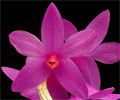
Pollen Parent Flower |
Click to Enlarge
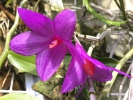
Offspring 'MC7344' Flower |
Click to Enlarge
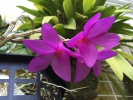
Offspring 'MC6309' |
Click to Enlarge
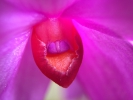
Offspring 'MC6309' Closeup of Flower |
Click to Enlarge
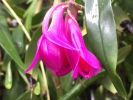
Offspring 'MC7344' Buds |
| Offspring photos are siblings of the plants you would receive. |
|
|
|
| |
Culture Notes from Donor: Parent plants: Temperature range I (60-83°F)
For additional origin/habitat information supplied courtesy of
Charles and Margaret Baker, see further below, near the bottom of this page.
|
Temperatures we attempt to use in the lab & greenhouse:
| For Species: |
|
Spring, Summer, Autumn, Winter: days average 85°F, nights 76°F; best fit is Warm 90-70°F
(Source:
Baker's Web OSC) |
|
About the name...
| Etymology of |
Dendrobium |
|
From Greek "dendron" tree and "bios" life.
(Source:
Pridgeon 1992) |
| Etymology of |
sulawesiense |
|
Means "from Sulawesi" (formerly Celebes, in Indonesia).
(Source:
Troy Meyers) |
| Pronunciation of |
Dendrobium |
|
den-DRO-bee-um
(Source:
Pridgeon 1992) |
| Pronunciation of |
sulawesiense |
|
su-la-wes-ee-EN-see
(Source:
Dave's Garden Botanary) |
|
If you would like to direct someone to this web page, please copy and paste this URL into your email:
http://troymeyers.com/d?016121
| Flask Information |
| Availability: |
We have sold all of the flasks for this item. |
| You should: |
Consider getting individual plants or compots instead of a flask.
You can place a "Notify Flask Recipients" Request, and either we or a flask recipient may contact you when plants are available.
You may also place a "Notify Retries" Request, and if an identical pollination (the same parents) is done again, we'll let you know.
You may reserve a flask, but it's very unlikely you'll get one ...this could only happen if we found a flask that we didn't know we had. |
| Yield Estimate: |
420 plants (based on flask surveys done 02/23/2009 through 12/07/2010)
|
| Plantlet Sizes: |
From many flasks 1 - 90 mm plants (based on flask surveys done 05/16/2008 through 05/09/2011)
From one most recently surveyed flask 40 - 90 mm (05/09/2011)
|
|
You might also want to:
|
View the seed assay for this item.
View items of the same species.
View items of the same genus.
|
| Ordering Information |
| You are not currently logged in. |
|
You must be a registered user and be logged in to reserve a flask or place a notification request. Please log in:
|
|
|
|
|
|
| |
The origin/habitat information below is supplied courtesy of Charles and Margaret Baker
The following information is based on the name of the plant provided by the donor, and assumes that the name is correct. If the plant has been misidentified, then the following information may not be correct.
This text is copyrighted by the Bakers and may not be reproduced without permission.
ORIGIN/HABITAT: New Guinea and the Molucca Islands. In Western Province of
Papua New Guinea, plants grow at low elevations along swampy rivers. In
Irian Jaya, plants were collected along the Noord River. On the other
hand, Dendrobium crepidiferum J. J. Smith, now considered a synonym of
Dendrobium glomeratum, was found on Ternate Island in the Moluccas where
plants were reported as growing in old forests at about 3950 ft. (1200 m).
They have also been reported at higher elevations on Halmahera Island.
More about this information and the Bakers...
|
|
|
| |
|
|
|